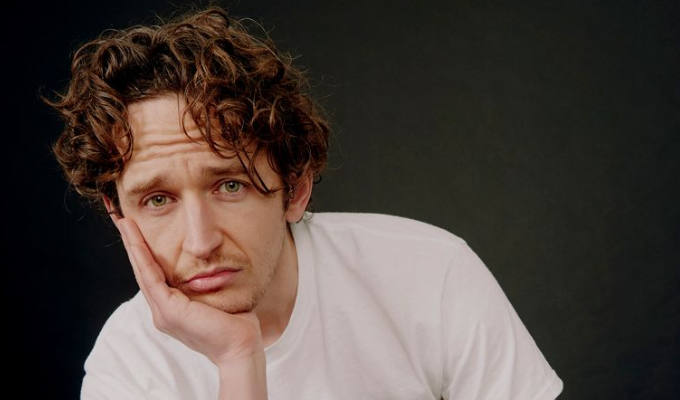
BBC topical comedy is 100 years old tomorrow
Historian finds the first ever news-based stand-up routine from 1923
The first known topical stand-up routine on British radio aired exactly 100 years ago tomorrow, comedy historian Alan Stafford has found,
It came from the first comedy star to emerge in the new medium of radio, a Yorkshireman called John Henry, who was an amateur comedian.
‘The BBC had been in existence for less than a year, but already theatre managers feared their audiences would rather stay at home and listen to the radio,’ explains Stafford (pictured, inset). ‘Many popular comedians were banned from broadcasting, so the BBC had to find its own comedy stars, and its first major discovery was an office worker called John Henry.’
Henry, whose real name was Norman Clapham, was a civil servant working at the Board of Trade by day. But on radio he rapidly achieved popularity telling his tales of woe in doleful monotonous Yorkshire tones. ‘It’s not the kind of act that would have wowed them in the theatres,’ says Stafford. ‘But it was perfect for the intimacy of radio.
‘In those early days his audience would be listening through headphones on rudimentary "crystal" radios where reception could be very variable. John Henry’s voice managed to cut through all the crackles and static and it seemed as if he was talking directly, and conspiratorially, to the solitary listener. It’s a style rather reminiscent of Les Dawson and quickly turned John Henry into the first true radio comedian.’
One of his early monologues, which aired on August 16, 1923, was John Henry’s Wireless-Controlled Elephant. This remarkably surreal tale involved him borrowing an elephant from the local zoo, taking it back to his top-floor flat, and training it to obey commands via the radio. Such was its popularity, it was soon snapped up by a record company.
‘John Henry had quickly realised that, unlike theatre comics, he needed a fresh routine for each broadcast,’ says Stafford. ‘I’d always assumed that this bizarre story was complete invention. But in my research, I discovered it was based on a real-life event that happened just a week earlier.’
In those pioneering days the BBC was trying out all kinds of publicity stunts, with the aim of getting press coverage, attracting more listeners and increasing its revenue. In early August 1923, they attempted to see if an elephant in London Zoo would obey commands when its trainer wasn’t physically present. So a loudspeaker was rigged up in the elephant’s enclosure and the trainer barked his commands from the radio studio. Needless to say, the elephant totally ignored him. But this fiasco inspired John Henry to come to the BBC’s studio in Savoy Hill seven days later armed with a brand new routine.
It starts with a BBC official telling Henry: ‘We’ve been experimenting with an elephant, but we’ve mucked it up. Now go and make this experiment a success for the honour of the Broadcasting Company.’ So Henry borrows an elephant named Percy from the local zoo and walks him home because ‘they wouldn’t let me take Percy on the tram’.
He struggles to get Percy up the stairs to his top-floor flat. ‘I had a bit of bother getting Percy up there. And anyhow, the walls always were weak. But the bannisters were all right – before we arrived.’ And finally the training begins. ‘I only have a crystal set, so I put the earpieces on Percy and went to give the first word of command: Lie down! And I’ll give Percy credit. He did lie down. But I can never forgive the woman who lived underneath. I wasn’t responsible for the floor being weak, and if she’d been in the bed when Percy fell on it, she’d have had something to grumble at.’
Here is the routine as it was released on gramophone the following month.
This was John Henry’s fourth appearance on BBC radio, which had started as London-only service 2LO in November 1922, before other regional stations were launched. So far there is no evidence of any other comedian doing a complete topical routine before August 16, 1923.
Stafford believes this tale was the making of John Henry. ‘It was a kind of audio cartoon. And this was several months before original radio drama properly began, with a play set in a coal mine. The BBC even suggested listeners turned the lights off.
‘But John Henry succeeded in painting vivid absurdist pictures while radio dramatists were still groping around in the dark. He went on to become the first radio comedian to have his own comic strip. Months later he broadcast a comedy routine from an aeroplane flying over London which, even today, would be a pretty remarkable stunt.’
John Henry’s fame was relatively short-lived, and a personal tragedy led to him taking his own life in 1934. He killed himself a month after the death of his romantic and stage partner Gladys Horridge. At her inquest he said they were man and wife, although in reality he was still married to his first wife, and, combined with his grief, he feared the scandal over his lies would affect his career.
‘I suspect his early death is why he’s largely forgotten today. But he was one of the great innovators of radio comedy and deserves far more recognition,’ Stafford said.
‘When Frankie Howerd was starting to make it big on radio, Eric Sykes scripted a similar tale about taking two elephants on the London Underground. When clips of this featured in a TV documentary, present-day comics seemed astounded at such surrealist humour from 1947. But John Henry had done it all before in 1923.’
Alan Stafford has written a biography of John Henry to be published by Fantom Publishing in the autumn. ‘It’s a celebration of a man who, despite a highly complicated private life, became the BBC’s first great radio comedian and, as it turns out, its first topical one too.’
The news comes as the BBC pilots a new series of Radio 4 topical comedy shows in the Friday 6.30pm slot.
Published: 15 Aug 2023






